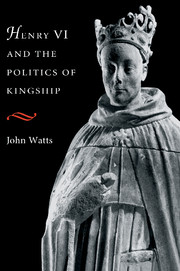Book contents
- Frontmatter
- Contents
- Preface
- List of abbreviations
- 1 Introduction: ideas and politics in fifteenth-century history
- 2 The conceptual framework
- 3 Government
- 4 Features of Henry VI's polity
- 5 The years of transition, 1435–1445
- 6 The rule of the court, 1445–1450
- 7 The search for authority, 1450–1461
- 8 Conclusion
- Bibliography
- Index
1 - Introduction: ideas and politics in fifteenth-century history
Published online by Cambridge University Press: 19 January 2010
- Frontmatter
- Contents
- Preface
- List of abbreviations
- 1 Introduction: ideas and politics in fifteenth-century history
- 2 The conceptual framework
- 3 Government
- 4 Features of Henry VI's polity
- 5 The years of transition, 1435–1445
- 6 The rule of the court, 1445–1450
- 7 The search for authority, 1450–1461
- 8 Conclusion
- Bibliography
- Index
Summary
What was the character of public life in fifteenth-century England? That is the biggest question which this book seeks to answer – or to answer, at least, in some measure. Old-fashioned as it sounds, it is actually quite a new question, for the simple reason that until recently fifteenth-century England was thought to possess very little which could be described in such terms. Instead, it has been traditional to argue that in this period the attentions of public figures were focused mainly on their private concerns, their personal interests and those of their lords and servants; and that the framework of public institutions and ideas they had inherited – the ‘constitution’, as it came to be known – was at best neglected by them, and at worst unpicked. Even before 1500, political commentators and historians were bemoaning the corruption of public life by the private interests of leading politicians. To many of these contemporaries, it appeared that the public good, or ‘common weal’, faced destruction at the hands of men who put the claims of self, family or party before those of king and community; who abandoned the old political virtues and sought their own material satisfaction instead. Centuries later, the first academic historians took a similar tack. When, in 1878, William Stubbs came to write the third volume of his Constitutional History, it seemed to him that the history of England in the fifteenth century contained ‘little else than the details of foreign wars and domestic struggles’. The ‘parliamentary institutions’ which he took to be the natural forum for public affairs had been reduced to ‘insignificance among the ruder expedients of arms, the more stormy and spontaneous forces of personal, political and religious passion’.
- Type
- Chapter
- Information
- Henry VI and the Politics of Kingship , pp. 1 - 12Publisher: Cambridge University PressPrint publication year: 1996



